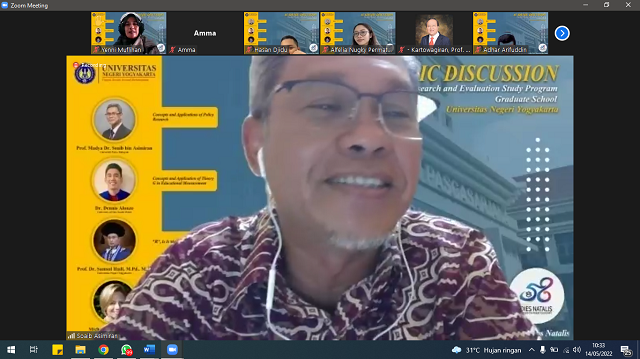You are here
CONCEPT AND APPLICATION OF POLICY RESEARCH
Primary tabs

Education policy is related to the philosophy and goals of education. Nowadays, we often encounter critical questions related to education policy. Should education policy be measured and/or evaluated by numbers obtained by the system or by educational philosophy/objectives? Is the statistical data showing current indicators of educational success a good signal or is there an error in the concept of education? Does the success of education today represent the true quality of education? began Prof. Dr. intermediate. Soaib bin Asimiran who is also the Dean of the Faculty of Education at Putra Malaysia University in the event of Academic Discussion of the Educational Research and Evaluation Study Program (PEP).Soaib added that the purpose of education certainly has a difference between basic education, secondary education, and higher education. Basic education aims to instill values, norms, knowledge, and skills for individuals so they are able to contribute to society. Then the purpose of secondary education is to instill knowledge and skills that are integrated with everyday life so the knowledge and skills possessed can be used for social and economic improvement of the community. In higher education, the purpose of education is to create a link between knowledge and skills to beget a knowledge-based economic society.
In reality, education is not operating correspondingly to the expected goals. In secondary education, most students with an upper socio-economic background have an interest in and successfully enter the field of science, while students from lower socio-economic groups choose to enter the arts and social sciences. Studying the field of science has become the focus of the elite group which is dominated by international subjects. This forces high school students of the arts and social sciences to drop out and enter the job market without the relevant knowledge and skills to do the job. Facing these conditions, an education policy is needed that can chip away horizontal and vertical discrepancies.
In higher education, education seems to have failed to produce intellectuals, philosophers, politicians, and socially capable leaders to lead the country. "An education system like this creates a big discrepancy where education does not balance out socio-economic status, so it can be considered to create new colonization through education," concluded Soaib ending this event. (wul/ant)
SEKOLAH PASCASARJANA UNY
Kampus Karangmalang, Yogyakarta 55281
Telp. +62274-550836 (front office)
Fax. +62274-520326 Email: pps@uny.ac.id, humas_pps@uny.ac.id
Website : http://sps.uny.ac.id
Copyright © 2024,



